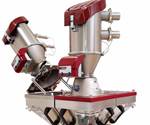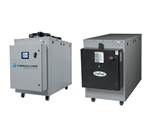Process Cooling: Variable-Speed Chillers Boast Dramatic Energy Savings
Variable-speed, air-cooled chillers from Delta T Systems complement water-cooled versions announced earlier.
After introducing a new line of variable-speed, air-cooled chillers last July (see May ’17 Close-Up), Delta T Systems, Richfield, Wis., is coming out in May with variable-speed, water-cooled chillers of 2 to 30 tons . A variable-speed compressor, together with an electronic expansion valve, a modulating control valve, and sophisticated controls are said to provide at least 30% to 50% energy-cost reductions. A 10-ton chiller operating one full shift per day reportedly could pay for itself in energy savings within three years.
Integration of variable-speed controls is proven technology but relatively new to process cooling. The number of brands offering this feature is gradually multiplying (see, for example, Keeping Up in June ’17 and Dec. ’17, and here). The new water-cooled chillers are said to offer temperature control within ±0.5° F, a stainless-steel and copper brazed-plate evaporator for reduced maintenance, nonferrous chilled-water piping, “the smallest footprint in the industry,” and advanced controls that are “ready for Industry 4.0.”
Learn more about these variable-speed chillers in a technical presentation at Plastics Technology’s Molding 2018 Conference, Feb. 27-Mar. 1 in Long Beach, Calif. The new chillers will also be on display at NPE 2018, May 7-11 in Orlando, Fla.
Related Content
-
Temperature Control: What You Need to Know to Comply With New Cooling-Fluid Regs
Beginning the first of this year, 12 states are following EPA bans on potentially damaging cooling fluids. Chiller suppliers have adjusted equipment designs to accommodate the new regulations. Here’s what all this means to processors.
-
ACS Group Adds Regional Sales Manager
Richard Gutierrez named Southwest regional sales manager.
-
Follow These Best Practices When Working With Heat Transfer Fluids
Effectively choosing, operating and maintaining thermal fluid can positively impact productivity in plastics processing.












